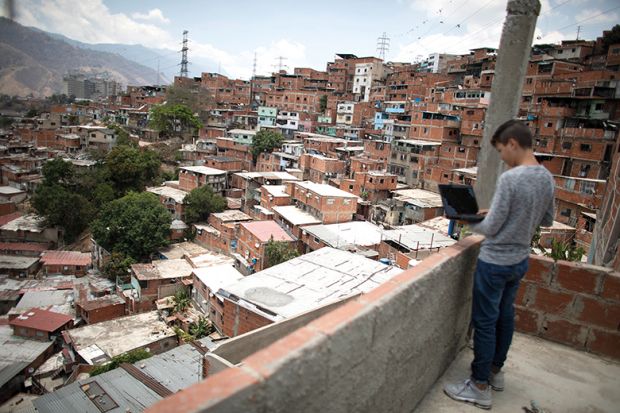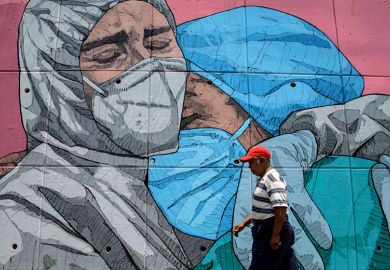Browse the THE Latin America University Rankings 2020 results
“There is growing awareness worldwide that the model of higher education employed since the founding of the University of Bologna may have run its course. The pace of change has been slow everywhere; but with a few notable exceptions, Latin America has been particularly slow to join the global discussion of new strategies for active learning, hybrid learning, competency-based learning, peer instruction and more.”
These words from international higher education consultant Liz Reisberg were written in a Times Higher Education supplement in 2017, before the coronavirus ripped through the continent. But they are particularly relevant in today’s post-Covid-19 world, in which universities have been forced to adapt quickly to online education. And while the pandemic has hit universities and students across the globe, it has posed some unique challenges for higher education in the Latin American region.
“What you have in Latin America is so many levels of problems,” Reisberg says in the wake of the coronavirus’ deadly appearance in the region. “One is that there has been a disregard and undervaluing of online education.”
Although some universities, such as Mexico’s Monterrey Institute of Technology, have developed high-quality online degrees, most countries in the region still do not recognise degrees earned online or, as is the case in Peru, stipulate a cap on the number of credits that may be gained via digital education, she says. The situation is not helped by the fact that accrediting agencies “have not really developed good strategies for how to evaluate online learning”.
“There is this denial that online could ever be as good as face to face. That’s a basic cultural premise that’s really hurting all of this right now,” Reisberg says. “How do you get beyond that when you have everyone going 100 per cent online for a semester?”
The content-heavy curricula common across the continent have also made it difficult for universities to switch quickly to online education.
Another major issue, according to Reisberg, is that most university degrees in Latin America are also professional qualifications, meaning that graduates in subjects such as law, psychology or architecture are automatically qualified to practise without obtaining a licence from a professional association.
“That makes the award of the degree scarier,” she says. “The question now – after you have this quick flip to online education, which most universities and professors weren’t prepared for – is are you going to recognise the work done during this chaotic transition period towards the professional licence? Or do you deny a whole generation this year because we didn’t know what we were doing?”
For Reisberg, the key issue is that “there has just been very limited investment in the professional development of teaching faculty throughout the region”, in part because of a reliance on casual part-time staff.
“If that [development] had been done over the past decade, all these universities would be in a much stronger position to adapt today. It just hasn’t been a priority,” she says.
Dante Salto, assistant professor of higher education at the University of Wisconsin-Milwaukee, agrees that the shift to virtual education in the wake of Covid-19 has been “a struggle” in Latin America because the region’s universities have “little technical infrastructure and instructional support to move online”.
What’s more, he continues, access to higher education in Latin America had long been “highly unequal”, and “the pandemic is exposing and even aggravating some of those inequalities” more starkly than in other regions.
“Although internet access has grown, only about 56 per cent of the population in Latin America used the internet in 2016. Even among those who have access to the internet, the quality varies a lot,” he says. “This disadvantages the poorest women and minorities in those countries.”
However, some universities have launched initiatives to help maintain access for poorer students.
One such institution is Brazil’s University of Campinas (Unicamp), which purchased mobile phone SIM cards with prepaid data allowances for 500 students and lent computers that had been donated by volunteers or departments at the university to a similar number.
Meanwhile, a programme that gives 2,000 students about £50 a day for commuting costs now helps these students pay for essential items during the pandemic, such as food, internet access or equipment.
“The main word here is ‘flexibility’,” says Unicamp rector Marcelo Knobel.
“Students can drop out of their course or cancel the semester without any implications for them. We are trying to make the bureaucracy of the university as flexible as possible in order to accommodate this really weird and unusual situation.”
But Knobel has less scope to reduce costs at the institution. About 70 per cent of Unicamp’s funding comes from a percentage of the value-added tax levied by the state of São Paulo – an income stream that Knobel says is likely to “drop drastically” as a result of a coronavirus-induced economic slowdown. But Knobel says he cannot fire any staff because they are all public servants, while Unicamp is also bound to pay the salaries of retired employees.
“The only way to work is to try to reduce everyday costs and try not to increase the payroll by not hiring anyone and not progressing careers,” he says.

Eric Hershberg, director of the Center for Latin American and Latino Studies at the American University in Washington DC, says the region is facing “absolute economic catastrophe”.
“We will have cases of double-digit decline in GDP this year. We will have cases of government revenues tanking. Keep in mind also that you have countries that are dependent for much of the state budgets on the exports of petroleum, which are now worthless,” he says.
“I think that about 25 per cent of the Mexican workforce will be unemployed over the course of 2020. And I think the state will have at least a third less revenue.”
Many public institutions in the region charge no or low tuition fees and do not provide student housing, so they may have less to lose than other regions from a potential decline in enrolment in the wake of the pandemic.
However, most private universities heavily rely on tuition fees, and many of their students are full-time workers who now may be out of a job.
“Given what’s going on with labour markets in Latin America now, I don’t know where they think those people are going to get that supplementary cash to pay those [fees],” Hershberg says, who goes on to predict that many for-profit institutions that have catered for the lower middle and working classes will “crash”.
Reisberg agrees that the situation appears bleak. “The economy in Argentina is a disaster. The economy in Brazil is a disaster. Even the state universities, though they’re not going to close and they’re not tuition dependent, are going to find themselves with budget shortfalls. I can’t imagine anywhere in Latin America where the public sector is going to be spared.”
On top of that, she adds, students are questioning whether they should be paying the same level of fees for online education that they did for face-to-face teaching.
“Expanded access has depended on the private sector. What happens when that sector is in trouble or starts to shrink? I think that’s a big question mark for the future,” Reisberg says.

Salto says public universities in Chile and Colombia may take a “harder hit” than their counterparts elsewhere in the region because they depend on tuition fees. But nevertheless, he predicts, they will “weather the situation better than their US counterparts”, partly because Latin American institutions do not rely on revenue from student housing or parking fees and partly because of demographic trends.
“The US is facing a downward trend in enrolments, and that has to do with demographic changes. Latin America is completely the opposite. There are more and more people demanding higher education; more people graduating from secondary education looking to access universities,” he says.
The question now for many in the sector is whether universities in Latin America will turn the Covid-19 disruption into an opportunity to innovate and reform their higher education model.
Salvador Peralta, associate professor of political science at the University of West Georgia and an expert on the politics of both higher education and Latin America, says the pandemic will at the very least spark a “robust debate” about the merits and drawbacks of online education.
“Just like [in the fight against] the virus, you can’t rely on ideology to make decisions about higher education. You have to rely on data, on evidence, on scientific research that gets at exactly what those flaws and advantages are. So I think that’s coming for sure,” he says.
“Five years from now, what I see is that there is going to be more online education because I think it’s necessary to reach the kinds of populations that many governments in Latin America want to reach.”
Reisberg, who claimed in 2017 that most universities in Latin America were “locked into tradition”, agrees that there will be “a lot more willingness to look at online education differently” post-coronavirus.
“There is a huge movement of people trying to say we need to think about a new paradigm for higher education in Latin America. Whether this will trigger that or not, who knows?” she says.
Unicamp’s Knobel, for one, is keen for his institution to place more focus on the “inverted classroom” model, in which students read material online and then use seminars to clarify and deepen their understanding through discussion and collaboration.
“Some kind of hybrid education could be interesting in some cases. I think this is a lesson that will stay from this experience,” he says.
But Salto remains unconvinced that the pandemic will herald long-term change for higher education in the region.
“Many universities will adapt for the time being, but they will try to return to whatever is normal afterwards,” he says.
“There will be more people knowing how to use certain tools, and face-to-face courses may actually take advantage of learning management systems and not only use them as a place to post readings. But I don’t see huge changes or innovations, unfortunately.”
POSTSCRIPT:
Print headline: Old model struggles to change gear
Register to continue
Why register?
- Registration is free and only takes a moment
- Once registered, you can read 3 articles a month
- Sign up for our newsletter
Subscribe
Or subscribe for unlimited access to:
- Unlimited access to news, views, insights & reviews
- Digital editions
- Digital access to THE’s university and college rankings analysis
Already registered or a current subscriber?







